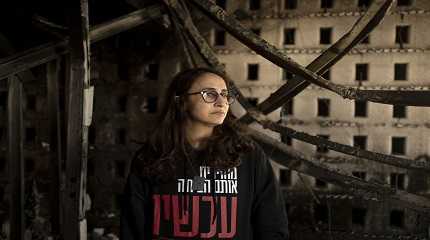
KIBBUTZ NIR OZ, Israel (AP) — Standing in the ruins of her home in the Nir Oz farming village on the Gaza border, Sharon Alony Cunio gazed at the distant skyline of Khan Younis, the Palestinian city where Hamas militants dragged her more than three months ago. Her husband, David, remains captive in Gaza.
He’s kilometers away but completely out of reach.
Cunio and her 3-year-old twins were released from Gaza on Nov. 27. They are physically healthy, safe. But she can’t stop thinking about her husband’s last words to her. He was skinny and frail, wounded in the leg, as the family embraced for a final time in captivity.
“Fight for me. Don’t give up,” she said he told her. “Please yell what I cannot yell. I’m scared as hell.”
David Cunio is among scores of captives believed to be alive in Gaza after 120 hostages, including his wife and daughters, were freed during a weeklong cease-fire.
As days spin by, punctuated by reports that other hostages have died in Hamas captivity, those freed have increasingly spoken out about the conditions they endured in Gaza. With the plight of the remaining hostages gripping the nation’s attention, those who survived hope to pressure the government into reaching another deal.
In an interview with The Associated Press, Sharon described the Hamas attack and her time in captivity, most of which she said was spent in a hospital — bolstering Israel’s claims that Hamas has abused protected medical locations for military purposes.
Her girls, Emma and Julie, don’t yet understand what happened to them after Hamas militants rampaged through southern Israel on Oct, 7, killing 1,200 people and kidnapping 250. The Hamas attack prompted a blistering Israeli offensive on the Gaza Strip.
In captivity, she told the girls the near-constant sounds of bombardment were just thunderstorms and the militants who guarded their door were their protectors. Now, when it rains in Yavne, the central Israel city where the three are staying with Sharon’s parents, the girls ask, “Mommy, where are the booms?”
On the morning Hamas militants attacked their home, the family cowered in their fortified safe room. David Cunio muscled the door shut against the intruders, his wife said, but they eventually flicked on the gas and lit the house ablaze.
As smoke poured in, David grabbed Julie and climbed out the window, leaving Sharon and her sister, Danielle, in the safe room with two children. Armed men stood outside.
“I started to lose consciousness,” Sharon recalled. “At that point, Danielle shook me and said, ‘Let’s open the window and get out. It’s much better if they shoot us. Then there will be no pain, no suffering, instead of watching us all choke to death in here.’”
But militants didn’t shoot them. Instead, they dragged them, with four other hostages, to Gaza on a tractor stolen from the kibbutz. In the melee, the family lost one of the twins — Emma was gone, and they feared it was for good.
Sharon, David and Julie spent 10 days in a Palestinian home, guarded by two Hamas militants. Their captors said they were in Khan Younis, Gaza’s second largest city, Sharon said.
“I had a mental breakdown, I had tics, I had panic attacks,” she told AP.
On day nine of captivity, the house next door was bombed. As the explosion sent the walls around them crashing in, David and Sharon climbed on top of Julie, protecting her. Glass pierced Sharon’s scalp.
Soon after, the captors moved the family. Sharon said militants covered her husband in a white sheet so he looked like a corpse and dressed her in traditional Arab clothes. They wrapped Julie in a cloth and pushed her into Sharon’s arms. They packed the family into an ambulance and brought them to a hospital Sharon said she now recognizes from the news as Nasser, in Khan Younis.
Three days later, Sharon said, she heard crying outside their room. She instantly recognized the cries as Emma’s.
“This guy just handed me Emma, like she’s a box or something. And I was shocked,” she said. “ I was certain she was dead. She was panicking and crying. I couldn’t believe that they brought her back to us.”




